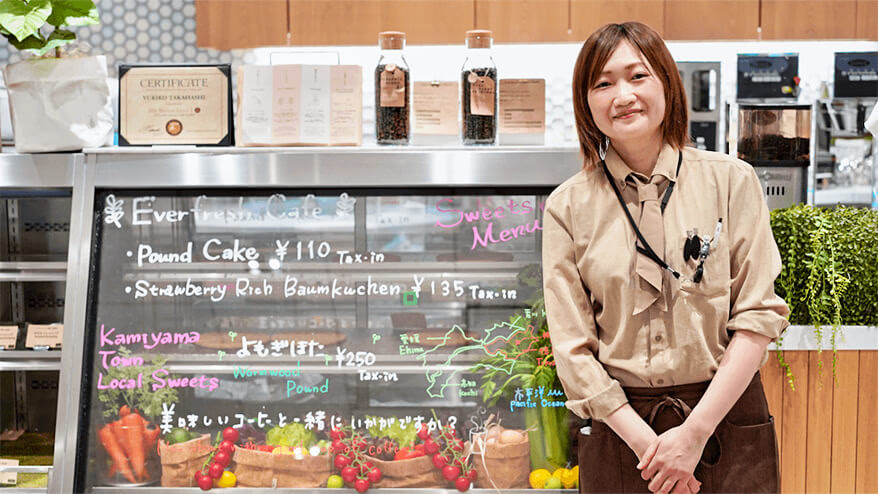こんにちは、京都で暮らすライター 杉本です。
ふだんは、自宅の机に向かって原稿を書くことが多いのですが、煮詰まったときはふらりと喫茶店やカフェへ。コーヒーを片手に過ごす15分ほどの時間が、オーバーヒートした頭を休ませてくれるのです。おうちであれお店であれ、誰かが珈琲を淹れてくれるってありがたいですよね。
2021年、MONOSUS社食研に入社した高橋有希子さんは、まさにそんな一杯を淹れてくれるバリスタさんです。今回は高橋さんが店長を務める、イギリスの大手製薬会社のオフィス内で運営するカフェ「Everfresh Cafe」を訪問。これまでの仕事のこと、MONOSUS社食研に来てからの日々についてお話を聞かせていただきました。
お父さんにおいしいコーヒーを淹れてあげたい
杉本:高橋さんがモノサスに入社するまでの経緯を伺いたいと思います。もともとバリスタとしてお仕事をされていたそうですね。コーヒーに興味をもったきっかけは?
高橋:子どもの頃、大好きな父が毎朝コーヒー豆を挽いてブラックで飲むのを見て、「あの謎の液体はおいしいのかな?」と思ったのがはじまりです。父が好きなものは私も好きになりたいから、砂糖とミルクを入れてもらってちょっとずつ飲めるようになりました。バリスタになったのも、「いつか、お父さんにおいしいコーヒーを淹れてあげたい」という気持ちからなんです。カフェ業界に入ったのは20歳のときでした。
杉本:バリスタになった娘にコーヒーを淹れてもらって、お父さんは喜ばれたでしょうね。
高橋:「おいしい!」って言ってくれるのかと思いきや、「んー。まあおいしいけど、まだまだだな」って(笑)。あとで母から「本当はおいしかったけど、素直に言えなかった」と聞いたのですが、「今度はおいしいと言わせてみせよう」と思って、最後は言ってもらいましたけど。
杉本:20歳からずっとカフェ業界で働いていたんですか?
高橋:ハーブやアロマにはまって、ハーブティのブレンダーをしていた時期もあります。でも、やっぱりカフェ業界に戻りたくなって。師匠に相談したら「自分のお店をもつなら、お酒の勉強も必要だよ」と助言をいただいて、バーテンダーを6年間経験しました。
2015年にバーテンダーの仕事を終えたとき、日本から初めてラテアートのチャンピオンが出たんですね。「そういえばラテアートの勉強をしていなかったな」と思い、バリスタ資格をもつ人がいるカフェで働こうと応募したら、そこに今の上司・荒井茂太さんがいたんです。
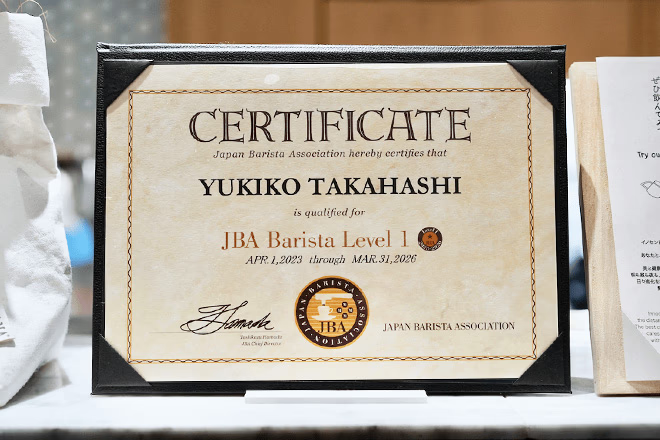
日本バリスタ協会の修了証
社員食堂ならではのお客さんへの気配り
杉本:当時の荒井さんはどんな仕事をされていたんですか?
高橋:Googleのフードマネージャーでした。Googleの社員食堂でバリスタチームをつくるために募集がかかっていたので応募したんです。
杉本:一般の店舗と社員食堂のお仕事は、どんな違いがあるのでしょうか。
高橋:一般の店舗は誰でも来られますが、オフィス内の食堂やカフェは基本的に社員の方だけが対象です。1日の来客数の変動も少なく、ほぼ平均した人数がいらっしゃいます。毎日のようにお会いするので、「今日はちょっと顔色が悪いな」と気づくこともできます。相手のようすを見て「今日はちょっと軽めにしますか?」「濃い目にしておきますね」と出すコーヒーを変えられるところにもやりがいを感じました。仕事の合間にコーヒーを買いにくるお客さんに、少しでもリラックスしてもらうところに自分たちがいる意味があるんだなと思いました。
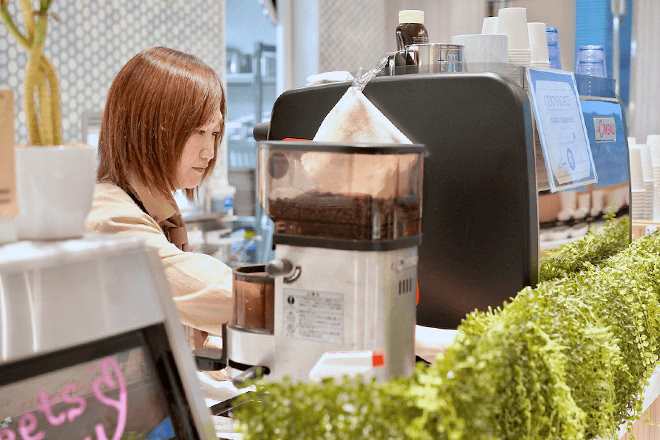
杉本:荒井さんとは、Googleで出会ってからずっと一緒にお仕事されているんですか。
高橋:荒井さんが、Googleを辞めて株式会社nonpiに移られたときは、そのままついて行きました。nonpiのメインキッチンのカフェのお手伝いなどをした後、この「Everfresh Cafe」の店長になりました。ただ、オープンして3年半経ったときにコロナ禍がはじまり、出社する人が減ったのでEverfresh Cafeをクローズすることになって。そのタイミングで私もnonpiを退職しました。
しばらく他のカフェで働きながら、「また荒井さんとどこかで仕事したいなあ」と思っていたら、銀座ソニービルに期間限定で出店していた「かまパン&フレンズ<ナチュラル物産館>」で「欠員が出たから、バイトだけどどう?」って言ってもらいました。その流れで、MONOSUS社食研のプロジェクトに関わるようになったんです。
2022年に入って、MONOSUS社食研がEverfresh Cafeの再開を手がけることになり、昨夏に再び店長として戻ってきました。社員のみなさんも覚えていてくれて「あれ?高橋さん!今までどうしてたの?」って声をかけてもらっています。
荒井さんとの仕事で広がった世界
杉本:さきほど「荒井さんとまた仕事がしたいなあ」と言われましたが、一緒に仕事をしたくなる理由を聞いてみたいです。
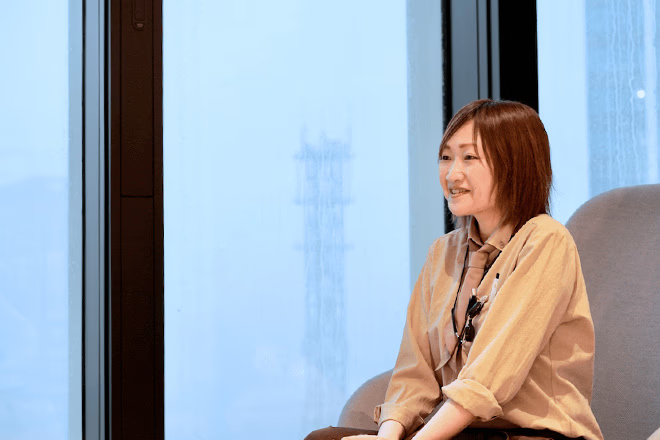
高橋:荒井さんは、すごく中立にものを見るんです。たとえば、Google時代はスタッフが何十人もいたのですが、「バイトか社員か」「男か女か」ということで差別しないで、人の能力を見極めて全員をまとめて動かしていくんですね。なかなか、そういうものの見方をできる人っていないなと尊敬しています。あと、荒井さん自身もバリスタの経験があるので、私がやりたいことに共感してもらえるんですよね。荒井さんのエスプレッソ、すごくおいしいんですよ!
それに、荒井さんがもってくる案件は、普通の仕事のようで違うみたいなところがあるので新しい発見ができます。かまパン&フレンズで働いていたとき、店長の弓削(今日子)さんにいろいろ説明を受けても、景色が見えないのでぼんやりしていて。でも、神山に行って農業チームの人たちと話すと「なるほど!」って。話を聞くだけじゃわかんないことがいっぱいあるんだなと思いました。もう飲食業界で20年働いていますが、MONOSUS社食研に入ってからは特に、初めての経験をすごくたくさんさせてもらっています。
杉本:神山では「神山まるごと高専」のお手伝いや、神山の学校給食をつくる給食センターのサポートにも入られたそうですね。
高橋:はじめは、高専のイベントのお手伝いで1週間の予定だったんですよ。それが結局2ヶ月ちかくの滞在になりました。給食センターの仕事も本当に新しい経験で。たとえば、野菜を洗うシンクは3つあって、そこに水を張って一個ずつ、キャベツやレタスも葉っぱを一枚ずつ3回洗うんですよ。一気に200食つくるオペーレーションを見るのも初めてで、驚くことばかりでした。
おいしいつくり手たちとの出会い
杉本:MONOSUS社食研に入って、コーヒー以外に仕事が広がっていくことについてはどう思っていますか。
高橋:ちょっと前までは、コーヒーのことだけやりたいと思っていました。でも、神山の農家さんや料理人さんたちの思いを聞くなかで、職種を問わず自分の知らない世界を見てみるのも新しい刺激になるのかなと思いはじめて。なんでもやってみたい、やってみようと思えるようになりました。このカフェでも、フードハブ・プロジェクト(以下、フードハブ)の野菜を使った食事を出しているんですけど、つくり手さんの思いを知っているからお客さんに伝えられるんですね。そこから新しいコミュニケーションも生まれるので、もっと知りたい気持ちが湧いてきます。
そういうことが、最終的に自分がやりたいコーヒーにもつながってくると思うんです。たとえば、野菜ってふだんから食べていますよね。でも、神山に行って「野菜ってこんなにおいしかったっけ?」とびっくりしました。最近は、スーパーの安い野菜を買えなくなって、私のお財布を苦しめています(笑)。競合が多いコーヒー業界で「コーヒーってこんなにおいしかったっけ?」と言われるものを自分はどうつくるのか?と思う。そういうことが増えたんですよね。
杉本:社食研のまわりにはおいしいものをつくる人がたくさんいると思います。おいしいつくり手さんたちと一緒にいて、高橋さんの「おいしい」も深まっていますか?
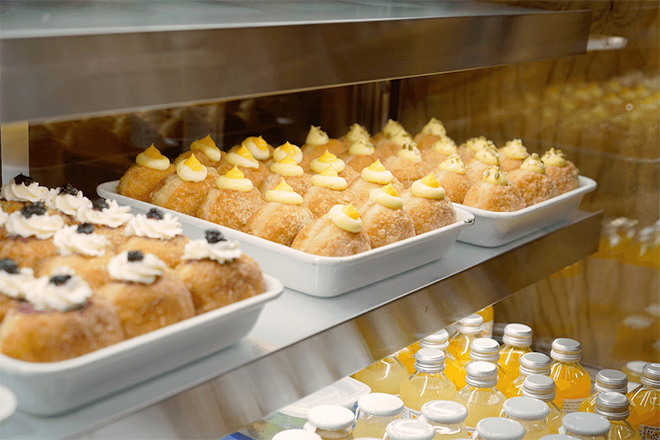
素材の味をいかしてつくられるFarmMart & Friendsのドーナツ
高橋:モノサスに入って、プロフェッショナルな人たちが多いので、刺激になっています。一番感動したのは、九段食堂やまるごと高専の食堂でメニュー開発をしている、料理人の細井恵子さんがつくるごはん。「この野菜はこの食べ方が一番おいしい」って知っておられて、味や香りをちゃんと生かされているんです。「すっごく簡単につくったものだけど」って出してもらったパスタがものすごくおいしくて。「これを簡単につくるんだ!」って驚きました。細井さんのごはんを食べた後は、他のお店のごはんを味気なく感じちゃうくらいです。
「なんでこんなにおいしいものばかりたくさん知っているんですか?」って細井さんに聞いてみたことがあるんです。そしたら「調べて取り寄せたり、実際に食べに行ったりしている」って聞いたので、ホンモノだ!と思いました。弓削さんもすごくたくさんの商品を知っていて、やっぱり「自分で調べて買ったり、現地に行って買ったりする」と言われていて。
でも、よく考えたら私も同じなんです。気になるカフェはすぐ行っちゃうし、遠くてすぐに行けないお店のコーヒー豆を取り寄せて淹れてみたりします。ジャンルは違っても同じなんだなって気がつきました。
コーヒーは“仕事”じゃないんです
杉本:好きなことを仕事にしていると、プライベートな時間も仕事のことを考えてしまうので、オン/オフの切り替えが難しいのでは?
高橋:私は、基本的に出社してユニフォームを着たら「オン」、脱ぐと「オフ」になります。オフのときは、人に関わると疲れちゃうしひとりでいるのが本当に好き。「私」という存在を消しているので、私服に着替えてエレベータに乗っていると、お客さんに二度見されて「高橋さん……、高橋さんですよね?」って(笑)。全然気づかなかったと言われるくらい違います。
杉本:接客に関しては「オフ」にできるけれど、休日にカフェに行ったり、コーヒーについて考え続けてしまいませんか?
高橋:あ、コーヒーについては「仕事」と思っていないところがあります。自分のなかでコーヒーは切っても切り離せないものなので。休みの日にカフェに行こうと思うのも、おいしいものをどんどん見つけたいからです。時代もどんどん様変わりして、いろんな新しいものができています。自分がコーヒーをやっていくためには、新しい情報をどんどん入れていかないと、古い情報で止まって狭い世界しか見えなくなる。それに、カフェに行くこと自体が趣味みたいなものなので、「行きたい」みたいな感じなんですよ。それが仕事につながるみたいな感じですね。
杉本:今のお仕事のなかでは、コーヒーに関する新しい挑戦はありますか?
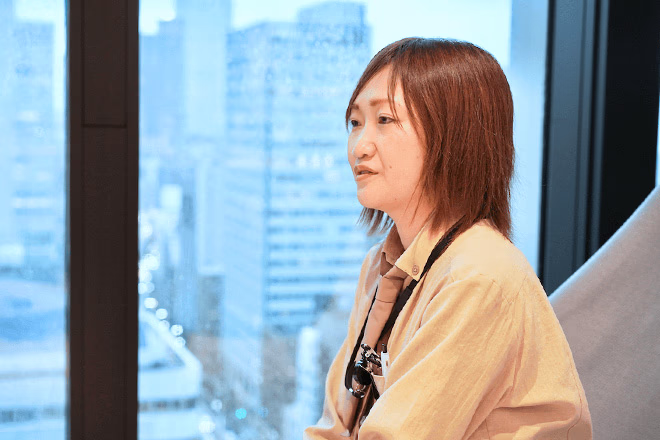
高橋:FarmMart & Friendsのコーヒー「ドーナツブレンド」をつくったことです。弓削さんと種本(寛子)さんから「絶対に神山の『豆ちよ焙煎所』の珈琲豆を使ってほしい」と言われたので、まずサンプルを送っていただいて味を見るところからスタートしました。実は、その時点ではまだドーナツはまだ完成していなくて。今までの傾向からすると素材を生かしたものになるだろうから、インパクトの強いコーヒーではドーナツがぼやけてしまう。あくまでもドーナツを主役にして、それに合うコーヒーを目指すことにしました。
ドーナツ試食会の直前まで、豆ちよさんに焙煎度を変えてもらったり、豆の組み合わせを変えたりしながら、胃に穴が開きそうなくらい試飲しました。試食会でドーナツと合わせて飲んでみたら、ドーナツにぴったり合ったので「やったー!」と思いましたね。荒井さんと真鍋さんにも褒めてもらいました。
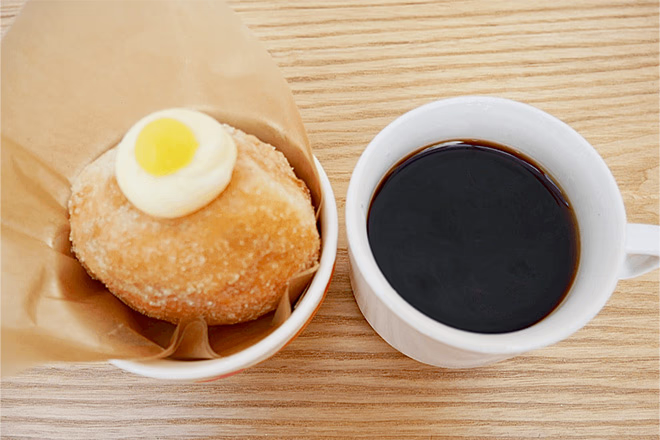
甘いドーナツに負けないボディがありつつ、やさしい味によりそうコーヒーにしあがりました
杉本:コーヒーに関して、これからやってみたいことはありますか?
高橋:焙煎してみたいと思っています。生豆と小型の焙煎機を買って、少しずつやってみているところです。
杉本:いつか高橋さんが焙煎したコーヒーを飲むのを楽しみにしています!ありがとうございました。
インタビューの後、高橋さんがラテをつくってくれました。
ひとくち飲んで「やさしいな」と思いました。コーヒーがミルクの甘味にふんわり包まれて、絶妙なバランスを保っていて、気持ちがほぐれていくのです。

「ひとりでも多くの方がおいしいって、心が落ち着くと思ってくれる方がひとりでも増えたらいいなという気持ちで、いつもコーヒーを淹れている感じですね」。
そんな高橋さんの言葉が、そのままカップのなかに入っているような気がしました。近くにこんなラテが飲めるお店があったら、原稿書き終えるたびに行くだろうな。また、高橋さんのラテを飲める日を楽しみにしています。
